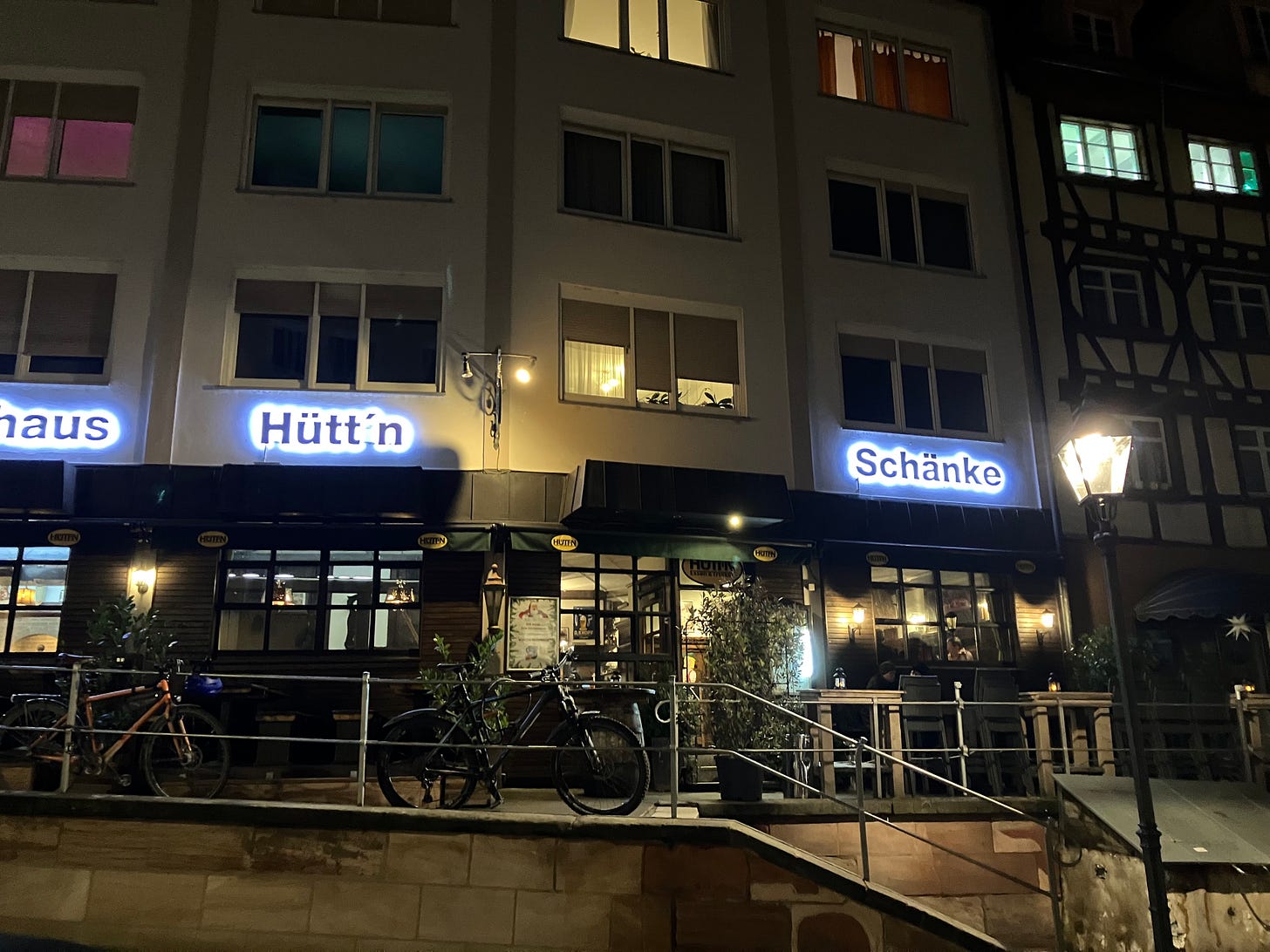Four men and one woman are drinking beer and talking and laughing, unconsciously demonstrating, perhaps, that they are regulars and belong in a pub called Hütt’n, in Nuremberg’s Old Town. ‘Ja!’ says one as if to emphasise a point he is making. He has a blush of red on his face, a light crimson bloom on his nose and what looks like the glisten of sweat on his cheeks and forehead. He takes a deep swig from his half-litre glass of Helles and lets out a loud exclamation of satisfaction. They are friends, I presume, and belong here. I, on the other hand, am a visitor, a tourist in someone else’s public space to where the group I am watching come, I would guess, at least once or maybe twice a week. However, I feel like I too also belong, if only for a short time.
I talk with the Romanian barman, who is called Luciam. His English is good. He is from Timișoara and was caught up in the 1989 riots that kicked off the Romanian revolution. ‘It was dark,’ he tells me, while serving a glass of bock brewed in Forchheim, a town halfway between Nuremberg and Bamberg, ‘and I was supposed to go home. I was only 13 and it was the first time I ever saw dissent. We saw police coming and ran home and over the next couple of weeks people got killed, and there was shooting from tanks and helicopters. It was a bad time. I recall seeing people shot to shreds, and also thinking of how loud war was, especially for a 13-year-old kid.’
I hear an American male voice in another part of the bar. ‘Nuremberg is my kind of place, I went to university here.’ He is sitting at a table with another man. ‘I wouldn’t want to live anywhere else in Franconia.’ Meanwhile, I also spy at the opposite end of the bar at which I am sitting on a stool a man with a rock lion’s mane of thick hair. He is perched on an identical stool to mine. His glass is empty and I hear him order another beer. ‘Helles, bitte,’ he growls.
I consider my thoughts and think of how once again I am in a European bar, far from home, surrounded by people who belong as do I. I take a gulp from my glass of beer, an amber-coloured ocean of joy, a colour that is warm-hearted, a hug from a loved one who never lets you down; an elegant colour, well-dressed, timeless and stylish. Its depth of malt-flecked flavour is as deep as my thoughts and I am contented. I like this sense of belonging, for in a bar or pub in which you feel at home you get a pass to belong, which is how we navigate our way through life in the pub.
Belonging is important to me, even though when I am travelling I often feel like I am far away out at sea and parched with a longing to reach land and home, where I belong. Back in January I spent eight days between Prague, Nuremberg and Brussels. I visited bars, stayed in both hotels and a homely Airbnb, and saw friends and did some work (always a good way of galvanising a sense of belonging when travelling as it puts structure and purpose into life). I have a sense of belonging with regular visits to my local pub, but when you begin travelling and become a kind of nomad it can be possible to carry this sense of belonging along and when walking into a new pub, as I did on this benign evening, maybe the welcome and the mood handed out a temporary passport of belonging. We may drink in the company of strangers and, while looking for the lavatory, half think of the tale of the Minotaur in its maze and wish for a ball of thread, but if you know pubs you will belong.
The group of five stand and Luciam stops serving. It is time to return to my hotel and my temporary membership of belonging in this pub is over. Meanwhile on the way back I pass a statue of Albrecht Dürer on a plinth, and the combination of beer and the crepuscular light makes me imagine that when everyone is asleep he will step down and, in the manner of the Golem, explore the reconstructed streets of the city in which he had once lived. After all, he belonged.




What a brilliant piece, Adrian!